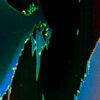Writer Fatima Bhutto, daughter of politician Murtaza Bhutto (who was assassinated in 1996), niece of Benazir Bhutto (assassinated in 2007), is in lockdown in rural England. Her Jack Russell, Coco, is about to give birth, and the signs are not good. After a long wait, a malformed puppy is delivered stillborn, and Coco, unhinged in grief, adopts the author’s hand instead, licking it red and raw. We can only speculate about her consciousness, but call it what you will – desperate maternal delusion or instinct – in Coco’s mind a hand is now an approximation of a puppy. A body part, like Gogol’s nose, has been brought to independent life. ‘The Hour of the Wolf’ is a personal meditation on grief, and the prehistoric bond between dogs and humans. It has a slightly uncanny quality, a sense of proportions slightly out of kilter, which is to do with the pandemic, or rather with lockdown. I don’t think we have quite processed yet what those months of isolation did to us – a time of fear and daily death tolls and also of unprecedented curtailment of our freedom of movement. But there were consolations. Those of us lucky enough to have dogs by our side learned to better read their expressions and body language as they learned to read ours, a conversation between two species evolving together over the millennia.
Oliver Sacks would have been interested in Coco’s delusion. He was a writer, but his quest to bring empathy to the diagnostic interaction – to sit with patients, listen to them, touch them, play them music, dance with them – was a way of making sense of suffering beyond language. In this issue, Will Rees describes the experience of trying to make sense of his own illness, at a time when he came close to being diagnosed with lymphoma. The narratives emerging from the doctors’ notes – Rees was copied in – always lagged a few days behind the latest medical investigations, and subsequent consultations seemed never quite to take all the details and results into account. This is not a story of hypochondria – it’s a story of an enquiring mind drawing its own conclusions, and then more conclusions. Does care fail if communication fails? To have pain, as Elaine Scarry wrote, is to have certainty; to hear about the pain of others is to have doubt. Rees draws attention to the complexities of medical communication, the mutual dance of patient and doctor governed, at best, by the logical steps of the diagnostic process.
The uprisings sweeping the Arab world challenged entrenched corruption and neglect in the name of justice, accountability and human rights, until one by one they failed. Lebanon seemed a more hopeful story, but ruled by power-sharing factions the country has stumbled through a gradual, then intense, decline. Charif Majdalani described what he saw in his vivid journal Beirut 2020: The Collapse of a Civilization, a Journal, translated from the French by Ruth Diver. I asked him if he had more material, and he did – this sequel is a tale of a capital now virtually without electricity or fuel. The stars are bright above Beirut’s blacked-out streets, and there are rumours of emaciated bears rescued from hellish cages by foreign NGOs, carried out on stretchers to safer environments. A street vendor from Syria reveals that his family is in a refugee camp in Turkey. Others have been saving to pay people smugglers; inflation has made their money worthless. Even hard-currency accounts are worth a fraction of their true value: money traders buy dollar cheques for fluctuating amounts – around some 12 per cent of their value – then sell them back to the issuing banks, who wipe the amounts off the accounts. Is it legal? What does the term even mean in this context, where corruption and factionalism are endemic, and where the landscape is scarred by money-laundering development projects and mountains of refuse? The Lebanese people, briefly uniting in the pro-democracy uprising of 2019, are now fracturing again into sectarianism and clans, keeping it all in the family.








